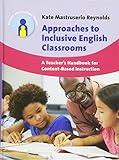Approaches to Inclusive English Classrooms : A Teachers Handbook for Content-Based Instruction / Kate Mastruserio Reynolds.
Material type: TextSeries: Parents' and Teachers' GuidesPublisher: Bristol ; Blue Ridge Summit : Multilingual Matters, [2015]Copyright date: ©2015Description: 1 online resourceContent type:
TextSeries: Parents' and Teachers' GuidesPublisher: Bristol ; Blue Ridge Summit : Multilingual Matters, [2015]Copyright date: ©2015Description: 1 online resourceContent type: - 9781783093335
- 9781783093342
- English language -- Study and teaching -- Foreign speakers
- Inclusive education
- Interdisciplinary approach in education
- Language arts -- Correlation with content subjects
- EDUCATION / Inclusive Education
- Content-Based Instruction
- Content-based ESL Instruction
- EFL teachers
- ELL teachers
- ELs
- ESL teachers
- Education
- English learners
- Inclusion
- K-12
- Program Development
- 428.0071 23
- PE1128.A2 R47295 2015
- online - DeGruyter
- Issued also in print.
| Item type | Current library | Call number | URL | Status | Notes | Barcode | |
|---|---|---|---|---|---|---|---|
 eBook
eBook
|
Biblioteca "Angelicum" Pont. Univ. S.Tommaso d'Aquino Nuvola online | online - DeGruyter (Browse shelf(Opens below)) | Online access | Not for loan (Accesso limitato) | Accesso per gli utenti autorizzati / Access for authorized users | (dgr)9781783093342 |
Frontmatter -- Contents -- Acknowledgements -- Introduction -- Section 1 Orientations to English Language Inclusion -- 1. Why Must I Do This? The Drawbacks, Benefits and Challenges with EL Inclusion and the Impetus for General Educator Preparation in EL Inclusion -- 2. I Just Want to Teach Math! Language is a Foundation for all Content Areas -- 3. A Framework for General Educator Development in EL Instruction -- Section 2 Models of English Language Inclusion -- 4 .Models: Sheltered Instruction Observation Protocol Model -- 5. Models: Cognitive Academic Language Learning Approach -- 6. Models: Response to Intervention -- 7. Models: Specially Designed Academic Instruction in English Model -- 8. Models: Center for Research on Education, Diversity & Excellence Standards and the Expediting Comprehension for English Language Learners Model -- 9. Models: Content and Language Integrated Learning and Content- Based Language Learning through Technology -- 10. The 'Winner': Which Model Should Be Chosen? -- Appendix A: Bloom's Taxonomy -- Appendix B: Dolch Words -- Appendix C: Example of a Unit with Differentiated Objectives for Content and Language -- Appendix D: Wisconsin Professional Development Plan Example -- Glossary -- References -- Index
restricted access online access with authorization star
http://purl.org/coar/access_right/c_16ec
This book provides educators with an accessible guide to best practices concerning content-based instruction (CBI) models and their use in English learner inclusive classrooms. The author effectively bridges the gap between theory and practice with a critical analysis of practical examples and diverse strategies for the inclusion of English learners into K-12 general education courses. The book also raises controversial questions regarding who is qualified to teach English learners and who is responsible for doing so, looking at the difficulties faced by both general educators and ESL teachers in Inclusive Classrooms. By providing a lens through which both ESL teachers and general educators are able to analyze, compare and contrast a range of widely-employed CBI methods, this book allows teachers to make informed decisions in their EL program development and work with English learners in K-12 schools.
Issued also in print.
Mode of access: Internet via World Wide Web.
In English.
Description based on online resource; title from PDF title page (publisher's Web site, viewed 24. Apr 2022)


